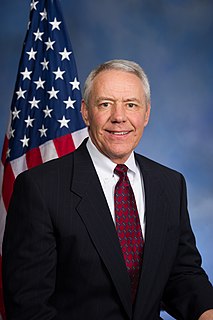A Quote by Michael Newdow
The Constitution says that government isn't supposed to be infusing religion into our society, and so I asked to have that upheld.
Quote Topics
Related Quotes
It [the Constitution] didn't break free from the essential constraints that were placed by the founding fathers in the Constitution, at least as it's been interpreted, and the Warren court interpreted it in the same way that generally the Constitution is a charter of negative liberties. It says what the states can't do to you, it says what the federal government can't do to you, but it doesn't say what the federal government or the state government must do on your behalf. And that hasn't shifted.
I'm a part of the GOP and let me tell you what my stance is. My stance is that, we the people have the responsibility to take care of the indigent in our society. It's not the government's job. You can read the Constitution all you want, it never says that it is the government's job and I think where we've gotten confused.
This issue is whether or not our government should be infusing religion into the public schools. Our churches are very strong in this nation and I think that's great and everybody should have the ability to worship as he or she sees fit. I choose to worship not believing in God and government should not thrust a religious idea down my throat.
There is absolutely nothing in the Mormon's religion inconsistent with the most patriotic devotion to the government of the United States. Revelation and the commandments of the church require that the Constitution and the laws of the land be upheld. It is also part of our belief that the time will come when the country will be distracted and general lawlessness prevail. Then the Mormon people will step forward and take an active part in rescuing the nation from ruin.
Journalism is the only profession explicitly protected by the U.S. Constitution, because journalists are supposed to be the check and balance on government. We're supposed to be holding those in power accountable. We're not supposed to be their megaphone. That's what the corporate media have become.
I believe in a wall between church and state so high that no one can climb over it. When religion controls government, political liberty dies; and when government controls religion, religious liberty perishes. Every American has the constitutional right not to be taxed or have his tax money expended for the establishment of religion. For too long the issue of government aid to church related organizations has been a divisive force in our society and in the Congress. It has erected communication barriers among our religions and fostered intolerance.
We have no government armed with power capable of contending with human passions unbridled by morality and religion. Avarice, ambition, revenge or gallantry would break the strongest cords of our Constitution as a whale goes through a net. Our Constitution is designed only for a moral and religious people. It is wholly inadequate for any other.
Does the U.S. Constitution stand for anything in an era of government excess? Can that founding document, which is supposed to restrain the power and reach of a centralized federal government, slow down the juggernaut of czars, health insurance overhaul and anything else this administration and Congress wish to do that is not in the Constitution?































